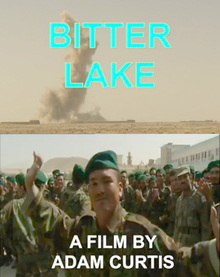Bitter Lake (film)
| Bitter Lake | |
|---|---|
 |
|
| Directed by | Adam Curtis |
| Produced by | Lucy Kelsall |
| Written by | Adam Curtis |
|
Running time
|
137 mins (2h 16m 44s) |
| Country | United Kingdom |
| Language | English |
Bitter Lake is a 2015 BBC documentary by British filmmaker Adam Curtis. It argues that Western politicians have manufactured a simplified story about militant Islam into a good vs. evil argument, informed by and a reaction to Western society's increasing chaos and disorder, which they neither grasp nor understand. The film makes extended use of newsreels and archive footage, and intersperses brief narrative segments with longer segments that depict violence and war in Afghanistan.
The film attempts to explain several complex and interconnected narratives. One of the narratives is how past governments, including Russia and the West, with their continued, largely failing, interventions in Afghanistan, keep repeating such failures, without properly understanding the country's cultural background or its past political history and societal structure.
It also outlines the US's alliance with Saudi Arabia, especially the former's agreement to buy Saudi oil, for control of a key energy supplier during the cold-war era, with Saudi Arabia gaining wealth and security in return, with agreement withstanding provided it was allowed to continue its violent and fundamentalist interpretation of Islam, Wahhabism, uninhibited from external influence. This in turn has fed like a feedback loop back into the many troubles the world faces with regards to various militant Islamic forces spanning the 1970s to present day; be they the Mujahideen, Taliban, Al-Qaeda, and into IS.
Curtis describes the film as an attempt to add an "emotional" dimension to the context of the historical narrative in order to draw its audience in – hence its over two hours in length and availability exclusively through the BBC iPlayer – in order to give the viewer something beyond the disconnected news reports they're usually fed from most traditional broadcast journalism, along with putting historical facts in a truer broader context.
...
Wikipedia
